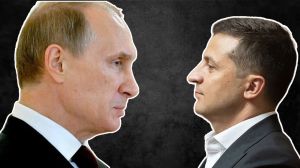OPED By M. A. Hossain
The Ukrainian government faces enormous challenges and risks from internal divisions and the waning support of its Western allies. President Vladimir Putin has skillfully managed the war that erupted in February 2022.
By the end of 2023, the delivery of military equipment to Ukraine will reach its lowest level since the conflict began. Kyiv has mainly depended on the weapon stockpiles of its allied countries, and the IMF has announced that the Ukrainian economy can only survive for ‘a few months’ without Western financial aid.
Moreover, the possible return of a Republican president after 2024 would be a significant setback for the US backing of Ukraine. However, the Hamas-Israel conflict has provided an opportunity for the Biden administration to deprioritize the Ukraine war.
Thus, the geopolitical factors, electoral cycles, arms transfers, and the availability of ammunition have left Zelenskyy’s fate hanging in delusion and illusion.
For the first time, the Pentagon disclosed an exact date for the depletion of resources meant to support Kyiv. According to Bloomberg, the US Department of Defense informed Congress that the funds allocated to replenish weapons for Ukraine would run out by December 30, 2023.
The US Senate Republicans have blocked a US$110.5 billion aid package for their allies. The Pentagon spokesman, Patrick Ryder, stated earlier this month that Washington would have to choose between its combat readiness and providing weapons to Ukraine due to a shortage of financial resources.
Additionally, at a summit in Brussels, EU leaders disagreed on a four-year financial plan of €60 billion for Ukraine. The Kremlin warned the EU that any shipment containing weapons to Kyiv would be considered a legitimate target.
Ukraine’s much-hyped summer counteroffensive failed to meet the expectations of its allies. Therefore, after nearly two years of war, the Atlantic nations are beginning to focus on their national security interests rather than those of Ukraine.
The West provoked the Ukraine war on Russia, a clear display of its hegemonic global agenda. Russia has not shown any imperialist or territorial ambition in this war. Zelenskyy came to power in 2014 through a Western-supported coup. He immediately started efforts to integrate Ukraine into the EU.
Since Ukraine lies within Russia’s sphere of influence, Russia opposed it, and this led to the conflict. The Secretary of Defense, Lloyd Austin, inadvertently exposed a broader, dishonorable motive for the proxy war during his visit to Poland in April 2022.
He said that Washington’s goal was not only to help Ukraine repel Russia’s invasion but also to ‘weaken Russia’ to the point that it could no longer pose a threat to any other country.
However, there is little regard for the impact on the suffering inhabitants of the country that serves as a battleground for the proxy war and surprisingly little concern for the wider geopolitical implications. It is simply to harass and bleed Washington’s rival, as well as boost the depleted US economy by the military-industrial complex.
The nature of war is inherently unstable, marked by constant changes in circumstances. There are some possible scenarios for the ongoing Russia-Ukraine conflict. Mainly, if Donald Trump or the Republican Party wins the upcoming 2024 US presidential election, it could significantly change the course of the Russia-Ukraine war.
A Republican president would likely reduce assistance to Ukraine and engage in diplomatic talks to end the conflict. The US would probably shift its focus to the Indo-Pacific region.
This recalibration would be a chance to strengthen Russia’s control over the occupied Ukrainian territories. At the same time, such a sudden change in US policy towards Ukraine would undermine its reputation as a dependable security guarantor for the EU and other parts of the world.
There could be another scenario: A drastic cut in Western support for Ukraine could lead to Russia completely taking over eastern and southern Ukraine. That would block Ukraine’s access to the Black Sea.
Unlike Ukraine, Russia has enough supplies of weapons for 2024. Mr. Putin has been preparing his military for more than a year. Russia has raised its 2024 budget for military spending.
Ukraine’s slow advance against Russia’s heavily fortified defense during the recent counteroffensive could lead to a war of attrition in the Ukrainian military. It is very doubtful that Ukraine will be able to launch another counteroffensive soon.
The right-wing, populist, Eurosceptic statesmen in the EU also complicate Ukraine’s future. Netherlands and Hungarian leaders Geert Wilders and Viktor Orbán oppose stronger EU sanctions on Russia.

Russia’s upcoming 2024 presidential election will significantly influence the Russia-Ukraine War. Putin could order his commanders to restart large-scale offensive operations with an ambition to seize new territories.
New battlefield victories would enhance his popularity and legitimacy among the Russian people, who may view him as a strong leader. He can also present himself as a protector of their national interests and sovereignty against foreign interference. The Ukraine issue will undoubtedly help Putin consolidate his power within his political system.
The West never cares about Ukraine. The country is used as a pawn to ‘weaken’ Russia in this proxy war. The Israel-Hamas conflict has provided the opportunity to escape from this proxy war for the West.
Zelenskyy is the lone man who has ruined Ukraine; indeed, he will be held accountable for many lives and cities in the future. And, the relations between Russia and the West will never improve through force and intimidation. Respectful and diplomatic postures are the only way to prevent conflict.
- M. A. Hossain is a political and defense analyst based in Bangladesh. VIEWS PERSONAL
- He can be reached at writetomahossain (at) gmail (dot) com




